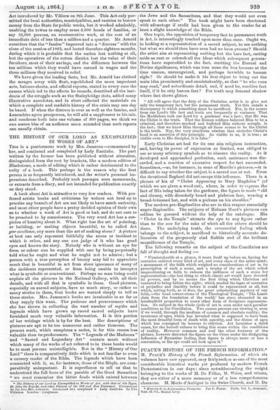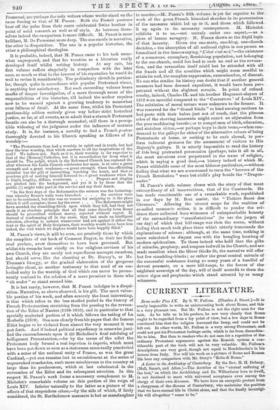PUAITX'S HISTORY OF THE FRENCH REFORMATION.* M. PlIAIIX'S History of
the French Reformation, of which six volumes have now appeared, may fairlyreckon as one of the most considerable historical works yet produced by modern French Protestantism in our days ; since notwithstanding the weight belonging to the works of M. De Felice, M. Weiss, and others, they are either of a more summary or of a less comprehensive character. M. Merle d'Aubigne in the Swiss Church, and M. De • Histoire de to Reformation Francais& Per F. Puns. Parte, Vol. I., Gramma ; Vols. 1L•VL, Michel Levy. Pressense, are perhaps the only writers whose works stand on the same footing as that of M. Puaux. Both the French pasteurs
bear off the palm from their more celebrated Swiss brother in point of solid research as well as of style. As between them- selves indeed the comparison is more difficult. M. Puaux is more
brilliant, M. De Pressense more deep. The one excels in narrative, the other in disquisition. The one is a popular historian, the other a philosophical theologian.
It is probable, indeed, that M. Puaux came to his task some- what unprepared, and that his vocation as a historian really developed itself whilst writing history. At any rate, his first volume suffers singularly in comparison with the later ones, so much so that in the interest of his reputation he would do well to revise it considerably. The preliminary sketch in particu- lar, though quite in accordance with popular Protestant views, is anything but satisfactory. But each succeeding volume bears marks of deeper investigation, of a more thorough sense of the responsibilities of the historian, till indeed the author requires now to be warned against a growing tendency to somewhat over fullness of detail. At the same time, whilst his Protestant partizanship seldom entirely gives way before strict historical justice, so far, at all events, as to admit that a staunch Protestant fanatic can also be a thorough scoundrel, still there is a percep- tible widening of the judgment under the influence of maturer
study. It is, for instance, a novelty to find a French Ftsteur thoroughly devoted to his Church speaking as follows of its worship :— " The Protestants then had a worship in spirit and in truth, but had they the true worship, that which answers to all the inspirations of the soul ? We believe not. Such as it is, their worship is far superior to that of the [Roman] Catholics, but it is nevertheless far from what it should be. The pulpit, which in the Reformed Church has replaced the altar whereon the Latin Church celebrates her mass, is at once a great strength and a great weakneas,—a great strength when the.officiating minister has the gift of instructing, touching the heart, and that so precious gift of making himself listened to ; a great weakness when he is frigid, lengthy, diffuse, wearisome Prayers and singing are pushed into the background, and yet it is by these that the public (!) might take part in the service and say their Amon.
"In the first days of the Reformation the sermon was the battering- ram whereby Rome's walls were breached. . . . Its services were not to be contested, but this was no reason for assigning to it the place which it still occupies ; there lay the error . . . The Reformers might have avoided the stumbling-block upon which they fell, had they not made it an absolute principle that all that came directly from Rome should be proscribed without mercy, rejected without regret. If, instead of condemning all in the mass, they had made an intelligent selection, allowing to subsist whatevever had not against it either the text or the spirit of Holy Scripture, their worship would have been less naked, the void which we deplore would have been happily filled."
M. Puaux's views, it will be seen, are precisely those by which the compilers of our book of Common Prayer, in their too little
read preface, avow themselves to have been governed. But whilst.his remarks bear chiefly on the religious services of his own Church, they are surely not superfluous amongst ourselves, but should serve, like the chanting at Dr. Binney's, or Mr. Thomas's liturgy, or the gradual elaboration of the gorgeous Irvingite ritual, as another testimony to that need of an em- bodied unity in the worship of God which can never be perma- nently realized in the relation of a mere preacher to those who " sit under " or stand around him.
It is but rarely, however, that M. Puma indulges in a disqui- sition. Narrative, as above observed, is his gift. The most valua- ble portion of his work, and often scarcely the least interesting, is that which refers to the less studied period iu the history of French Protestantism stretching from the passing to the revoca- tion of the Edict of Nantes (1598-1685), and in particular to that
specially neglected portion of it which follows the taking of La Rochelle (1628). One sees clearly from his pages that the famous
Edict began to be violated from almost the very moment it was put forth. And if indeed political expediency in somewise justi- fied the encroachments upon it till Richelieu's final subduing of belligerent Proteetantism,—for by the terms of the edict the Protestant body formed a real imperium in imperio, which must
have been put down so soon as a statesman arose really penetrated with a sense of the national unity of France, as was the great Cardinal,—yet one remains lost in astonishment at the series of unprovoked treacheries, each more mischievous to the country at large than its predecessor, which at last culminated in the revocation of the Edict and its subsequent atrocities. In this respect M. Puaux's work forms a necessary complement to M. Michelet's remarkable volume on this portion of the reign of Louis XIV. Inferior naturally to the latter as a picture of the effects of that stupendous crime,—by the side of which, if fairly considered, the St. Bartholomew massacre is but as manslaughter
to murder,—M. Puaux's fifth volume is yet far superior to the work of the great French historical sketcher in its presentation of the measures which led up to it, and those which followed it up again to its necessary consequences. M. Michelet exhibits it to us,—not untruly under one aspect,—as a piece of insane savagery. M. Puaux shows us the frigid logic of that insanity. Given the one-state, one-king, one-church doctrine,- the absorption of all national rights in one person as formulized in the famous saying, "L'Ilat c'est moi,"—the existence- of a numerous, exemplary, flourishing population, not belonging to the one church, could but lead to such an end as the revoca- tion, and the revocation itself could but be attended with all the frauds and all the cruelties which might seem needful to attain its end, the complete suppression, extermination, of dissent. No one who studies its history can doubt that if another general massacre had been deemed expedient, it would have been per- petrated without the slightest scruple. In point of refined cruelty, indeed, Charles IX. and his brother Huguenot-slayers of 1572 were merciful compared to the " Converters " of Louis XIV- The subtleties of moral torture were unknown to the former. It. was reserved for the " Grand Siecle " to bind nursing mothers to. bed-posts with their babes just out of reach, that the piteous cries of the starving innocents might extort an abjuration from the poor maddening heretic; or to compel men of birth, education,. and stainleis virtue,—or perhaps boys in their teens,—when con- demned to the galleys for either of the alternative crimes of being Protestants at home, or seeking to be such abroad, to per- form indecent gestures for the amusement of visitors to His. Majesty's galleys. It is utterly impossible to read the history of this long protracted persecution (perhaps, take it all in all,. the most atrocious ever perpetrated in the name of religion,. which is saying a good deal,—a history indeed of which M. Puaux withholds some of the most hideous particulars,—without feeling that what we are accustomed to term the " horrors of the Freuch Revolution " were but child's play beside the "Dragon- n ades."
M. Puaux's sixth volume closes with the story of that most extraordinary of all insurrections, that of the Camisards. He has made considerable use of a remarkable work, republished in our days by M. Bost senior, the " Thd&tre Sacre dee. Cdvennes." Allowing the utmost scope for the realities of so-called mesmeric action, it is difficult to ponder the evi- dence there collected from witnesses of unimpeachable honesty of the extraordinary " manifestations" (to use the jargon of our day) of which that hill-range was then the scene, without feeling that much took place there which utterly transcends the explanations of science ; although, at the same time, nothing is more calculated to disgust one with the bungling humbug of modern spiritualism. To those indeed who hold that the gifts.
of miracles, prophecy, and tongues indwell in the Church, and are made manifest when the Giver thinks fit, the narrative will offer but few stumbling-blocks ; or rather the great central miracle of the successful resistance during so many years of a handful of devout peasants, on a more hill-range, to the forces of the mightiest sovereign of the day, will of itself accredit to them the minor signs and prophecies which stand attested by so many witnesses.































 Previous page
Previous page